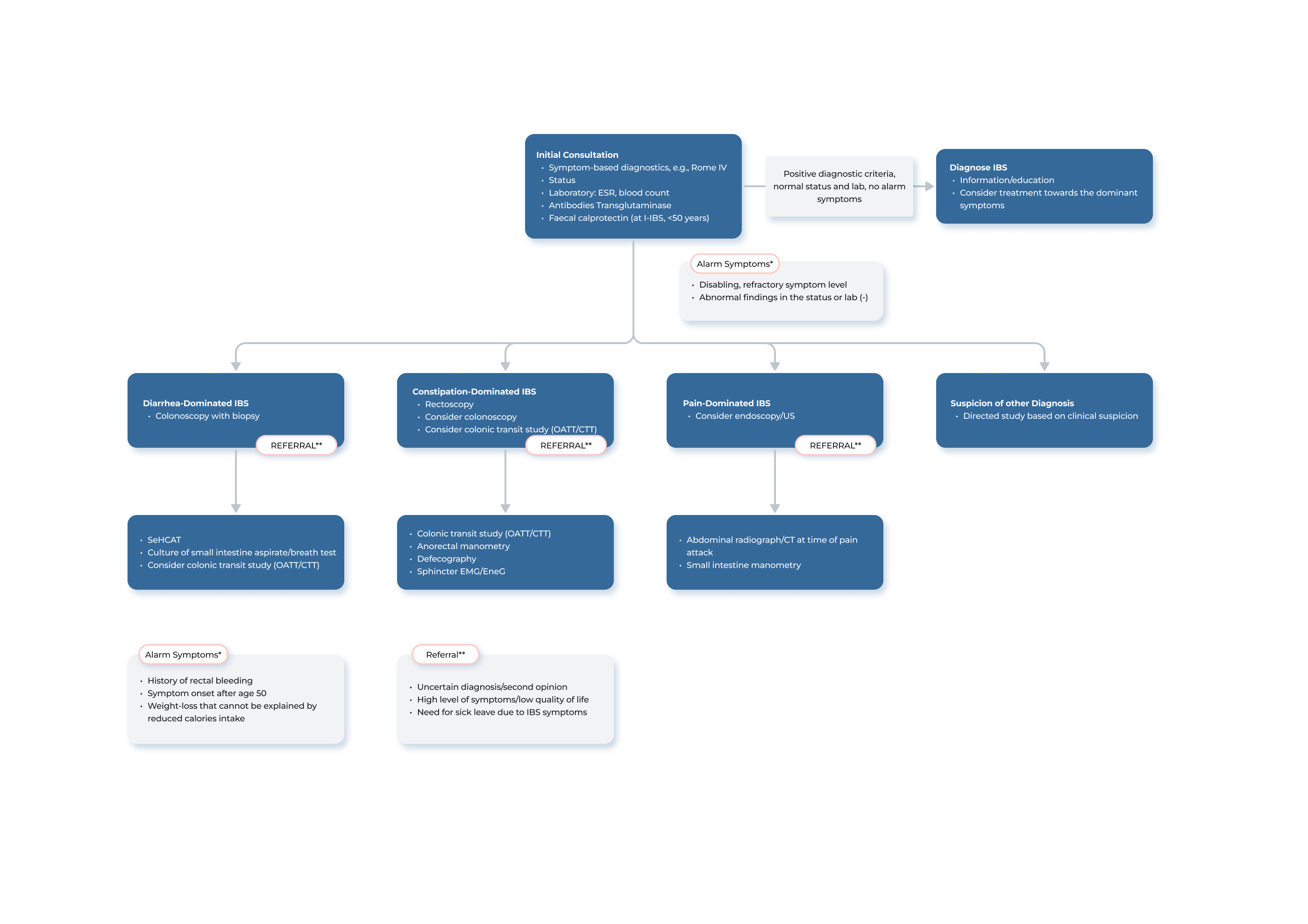Functional Gastrointestinal Disorders (FGID)
Functional gastrointestinal disorders are characterized by chronic (long-term) GI symptoms that arise due to the function or dysfunction of the digestive system.
Functional gastrointestinal and motility disorders are the most common gastrointestinal problems in the general population. It´s estimated that around 1 in 4 individuals or even more might experience these issues. These conditions make up about 40% of the GI problems that doctors and therapists help patients with.
The term “functional” is usually used to describe disorders in which the regular functions of the intestines’ movement, the sensitivity of the intestines’ nerves, or the brain´s control over these activities are disrupted.
Some of the most common functional gastrointestinal disorders are functional constipation, functional diarrhoea, and Irritable Bowel Syndrome (IBS).
Chronic Constipation
Chronic constipation refers to the persistence of infrequent bowel movements or difficult passage of stools for an extended period, typically lasting several weeks or more. It is often characterized by having less than three bowel movements per week. While occasional constipation is a prevalent issue in both adults and children, certain individuals may endure chronic constipation, significantly impacting their daily routines.
Signs and symptoms of chronic constipation include:
- Having less than three bowel movements per week
- Experiencing lumpy or hard stools
- Straining during bowel movements
- Sensation of a blockage in the rectum that hinders bowel movements
- Feeling of incomplete emptying of the rectum after a bowel movement
- Requiring assistance to empty the rectum, which may involve pressing on the abdomen or manually removing stool with a finger
Constipation may be classified as chronic if you have encountered two or more of these symptoms persistently for the past three months. Constipation that is long-term (chronic) or that keeps coming back requires more effort to diagnose and treat.
Chronic Diarrhoea
Diarrhoea is a prevalent condition characterized by the frequent passage of loose or watery stools. It can occur independently or alongside other symptoms like nausea, vomiting, abdominal pain, or weight loss. Acute diarrhoea goes away in a few weeks and becomes chronic when it lasts longer than 3–4 weeks. If no specific cause is found after a thorough investigation and certain criteria are met, a diagnosis of functional or chronic diarrhoea may be considered.
Irritable Bowel Syndrome (IBS)
Irritable bowel syndrome (IBS) is a common disorder that affects the stomach and intestines, also called the gastrointestinal tract. Its symptoms comprise cramping, abdominal pain, bloating, gas, as well as alternating episodes of diarrhoea and constipation, or sometimes both. IBS is a chronic condition that requires long-term management to effectively address its symptoms. A significant number of individuals experiencing moderate to severe IBS report a poor quality of life. Symptoms of IBS can vary and tend to persist for an extended duration. The most prevalent symptoms include:
- Abdominal pain, cramping, or bloating associated with bowel movements
- Changes in the appearance of bowel movements
- Changes in the frequency of bowel movements
Other related symptoms may involve a feeling of incomplete evacuation and increased presence of gas or mucus in the stool.
There are four types of IBS. Each type is named for its most common complaints, including constipation predominant IBS (IBS-C), diarrhoea predominant IBS (IBS-D), IBS mixed type (IBS-M), and IBS unclassified.
Information on this site should not be used as a substitute for medical advice from your doctor. Always discuss diagnosis and treatment information including risks with your doctor. Keep in mind that all treatment and outcome results are specific to the individual patient. Results may vary.
Aziz, I., Whitehead, W.E., Palsson, O., Törnblom, H. & Simrén, M. (2020). Expert Review of Gastroenterology & Hepatology. An approach to the diagnosis and management of Rome IV functional disorders of chronic constipation [electronic version]. Taylor & Francis Group, Vol. no. 14, 1-8.
Drossman DA., et al. (2016). Rome IV, the functional gastrointestinal disorders. Gastroenterology. Vol. 150:1262-1279.
Keller, J., Bassotti, G., Clarke, J., et al. (2018). EXPERT CONSENCUS DOCUMENT. Advances in the diagnosis and classification of gastric and intestinal motility disorders [electronic version]. Nat Rev Gastroenterol Hepatol., Vol. 15(5), 291-308.
Sperber, AD., et al. (2021). Worldwide Prevalence and Burden of Functional Gastrointestinal Disorders, Results of Rome Foundation Global Study. Gastroenterology. Vol. 160:99-114.










